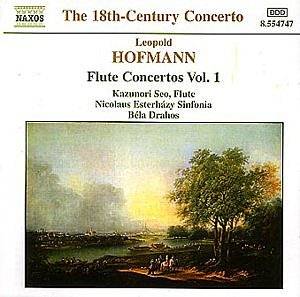 |
Leopold HOFMANN (1738-93)
|
There is not a great deal to be said about this disc. The Four Concertos (of 13) belong to the 1760s tipping over into the 1770s. They are of a piece in mood, model (three movements) and style each with allegros framing adagios. The allegros flit and skitter in decorative charm while the adagios chart the depths - the adagio of G2 in particular seems steeped in a romantic-erotic spirit which some might find cloying and either anachronistic or visionary. Was this an old-style choice of Kazunori Seo or an indication that Hofmann imbued greater passion into his adagios than was common (or decent) for the time.
The orchestral playing is spry and, going by auditory appearances, wakeful. You will not encounter much if anything in the way of competition.
I cannot pretend that this music is anything other than what my Belgian landlady of years gone by used to call 'zim-zim music' (minus harpsichord continuo) but it is smooth, handsome and unfacile.
If Mozartian legato given a conservatively romantic skew is your thing then this will be money well spent. Hofmann prepares the way for Weber and Schubert.
Dr Allan Bradley's indispensable notes time after time make the link with Haydn. I heard the disc before reading the notes and it was Mozart who leapt to mind as the closest cousin. Hofmann's popularity in the 1760s and 1770s is not to be wondered at. He was a most productive musician paying competent court to an audience with an insatiable taste for a well-turned smiling phrase and a fresh kick of the hooves.
Naxos's attention to sources deserves high praise. Full contact details for materials are listed on the back of the leaflet.
Hofmann wrote about sixty solo concertos so Naxos still have more than enough territory to cover. It sometimes seems that there is some truth in that April Fool's day joke about Naxos preparing a set of everything written by everyone. Time to buy some new shelving.
Rob Barnett